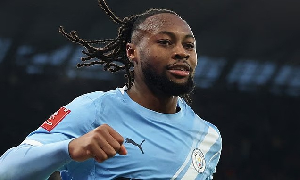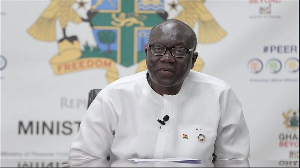Attorney-General and Minister of Justice, Ms Gloria Afua Akuffo, has prayed the International Tribunal for the Law of the Sea (ITLOS) in Hamburg, Germany, to uphold Ghana’s position on the maritime boundary dispute between Ghana and Cote d’Ivoire.
“Ghana, respectfully, asks you to affirm the customary equidistance boundary as our maritime boundary. In carrying out your task, you are assisted by a wealth of maps and charts which set out this boundary and which have been made available to you,” she said.
According to Ms Akuffo, the case was “not that of maritime delimitation but rather a request to declare the existence of a boundary, to which the parties have themselves long agreed and delimited in practice and in consequence”.
“Ghana asks this Special Chamber not to be swayed by the rather extravagant case Cote d’Ivoire seeks to present here by relying on a bisector theory and its related maps to create a huge area as the so-called area in dispute,” the Attorney-General prayed the court in her opening address at the ITLOS in Hamburg yesterday.
She said Cote d’Ivoire’s bisector claim was so unrealistic and without legal and geographical basis, to the extent that it should be dismissed in its entirety.
“After five decades of agreement and reliance, the plausible dispute, if any, is the much narrower dispute between the parties competing equidistance lines.
“Ghana, therefore, invites the Special Chamber to uphold what the parties have long observed in practice and under their respective domestic laws,” the Attorney-General said.
Ms Akuffo is leading a legal and technical team to the ITLOS to legally battle out the merits of the dispute concerning the delimitation of the maritime boundary dispute between Ghana and Cote d’Ivoire.
Also in Germany is the immediate past Attorney-General and Minister of Justice, Mrs Marietta Brew Appiah-Opong, who formally introduced Ms Akuffo to the Special Chamber as taking over from her as an agent of Ghana.
Hearing
The first and the second rounds of oral arguments will come off from February 6 to 10, 2017 and February 13 to 16, 2017, respectively.
The President of the Special Chamber constituted to deal with the dispute, Judge Boualem Bouguetaia, is presiding over the hearing.
Other members of the panel hearing the case are judges Rüdiger Wolfrum, Germany, and Jin-Hyun Paik, the Republic of Korea.
Ad hoc judges Thomas Mensah, Ghana, and Ronny Abraham, France, were selected by Ghana and Cote d’Ivoire, respectively, per the rules of the ITLOS.
Arguments
Making a case for Ghana, Ms Akuffo noted that the fairness and goodness of equidistance as a method of delimitation, in the circumstances of the case, made it understandable why the two countries adopted it as a basis for their customary boundary.
“It is impossible to think of a fairer position. Does a fairly drawn agreed line suddenly become unfair simply because one state decides that it will be economically more advantageous for it if the line were drawn somewhere else?” the Attorney-General asked.
She noted that Cote d’Ivoire had still not provided any valid reason to justify a departure from the existing and agreed maritime boundary between it and Ghana.
She said in all the negotiations before the commencement of the case, Cote d’Ivoire did not present, and had still not presented, any reasonable grounds for departing from that shared understanding which had been in existence for five decades.
The Attorney-General noted that Cote d’Ivoire only laid claim to Ghana’s boundary after Ghana discovered oil in commercial quantities.
She told the tribunal that Ghana’s oil industry had contributed significantly to reducing poverty levels among its population.
Development of Ghana’s oil industry
While denying Cote d’Ivoire’s claim that Ghana had developed its (Cote d’Ivoire’s) oilfields, Ms Akuffo said that was far from the case, adding: “The truth is that Ghana developed its oil industry based on a pre-existing maritime boundary as mutually agreed and recognised by both parties.”
“It is based on this tacit, mutual understanding that, over many years, Ghana has developed this industry step by step from the first licensing of blocks through decades of studies, exploratory drilling and the eventual drilling of wells,” Ms Akuffo argued.
She said Ghana was, therefore, taken aback when, in 2011, Cote d’Ivoire directed oil companies to stop working on Ghana’s oilfields.
Inaccuracies
Three of Ghana’s lawyers — Professor Philippe Sands of Matrix Chambers, London; Mr Paul S, Reichler of Foley Hoag Chambers, Washington, DC, and Mr Fui S. Tsikata of Reindorf Chambers, Accra — also advanced legal arguments on Ghana’s behalf.
Using maps, diplomatic correspondence and agreements between the two countries spanning five decades, the lawyers advanced arguments to justify Ghana’s position that Cote d’Ivoire had no legal and geographical basis to claim any maritime boundary from Ghana.
Ghana will continue its second round of arguments today.
Ghana’s team includes officials from the Attorney-General’s Department, the Ministry of Energy, the Maritime Boundaries Secretariat, the Ghana National Petroleum Corporation (GNPC), the Environmental Protection Agency (EPA), the Petroleum Commission and lawyers from Ghana and abroad.
General News of Tuesday, 7 February 2017
Source: ultimatefmonline.com













